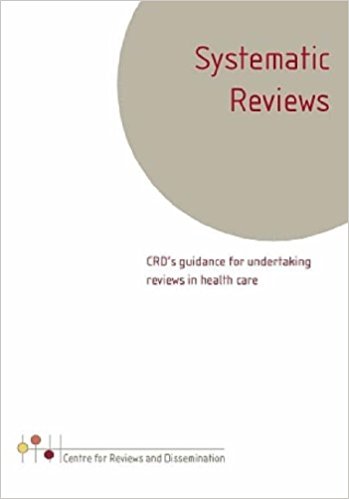
Cochrane Reviews are systematic reviews of primary research in human health care and health policy, and are internationally recognised as the highest standard in evidence-based health care resources.
The Campbell Collaboration is an international research network that produces systematic reviews of the effects of social interventions in Crime & Justice, Education, International Development, and Social Welfare.
The Guidelines for Systematic Reviews of Health Promotion and Public Health Interventions provides a working framework to conduct systematic review of a health promotion or public health intervention. The purpose of this handbook is to describe the steps of the systematic review process and provide some working examples to practice prior to commencing a review. It is not intended to be used as a single resource for conducting reviews. The pdf is available for download. 
Preffered Reporting Items for Systematic Reviews and Meta-Analysis. The aim of the PRISMA Statement is to help authors improve the reporting of systematic reviews and meta-analyses. We have focused on randomized trials, but PRISMA can also be used as a basis for reporting systematic reviews of other types of research, particularly evaluations of interventions. PRISMA may also be useful for critical appraisal of published systematic reviews, although it is not a quality assessment instrument to gauge the quality of a systematic review. Consider using PRISMA-P when completing your protocol. PRISMA-P is a 17-item checklist for elements considered essential in protocol for a systematic review or meta-analysis. The documentation contains an excellent rationale for completing a protocol, too.
 Centre for Reviews and Dissemination (CRD), University of York
Centre for Reviews and Dissemination (CRD), University of YorkCRD is a research department that specializes in evidence synthesis, assembling and analyzing data from multiple research studies to generate policy relevant research. It undertakes high quality systematic reviews and associated economic evaluations, develop underpinning methods, and promote and facilitate the use of research evidence in decision-making.
The Community Guide conducts systematic reviews of interventions in many topic areas to learn what works to promote public health. The Community Preventive Services Task Force (CPSTF) uses the results of these reviews to issue evidence-based recommendations and findings to the public health community.
Comparative Effectiveness Reviews are systematic reviews of existing research on the effectiveness, comparative effectiveness, and harms of different health care interventions. They provide syntheses of relevant evidence to inform real-world health care decisions for patients, providers, and policymakers. Strong methodologic approaches to systematic review improve the transparency, consistency, and scientific rigor of these reports. Through a collaborative effort of the Effective Health Care (EHC) Program, the Agency for Healthcare Research and Quality (AHRQ), the EHC Program Scientific Resource Center, and the AHRQ Evidence-based Practice Centers have developed a Methods Guide for Effectiveness and Comparative Effectiveness Reviews guide.

Institute of Medicine (IOM) recommends 21 standards for developing high-quality systematic reviews of comparative effectiveness research. The standards address the entire systematic review process from the initial steps of formulating the topic and building the review team to producing a detailed final report that synthesizes what the evidence shows and where knowledge gaps remain.